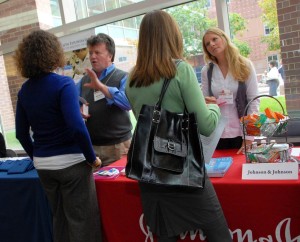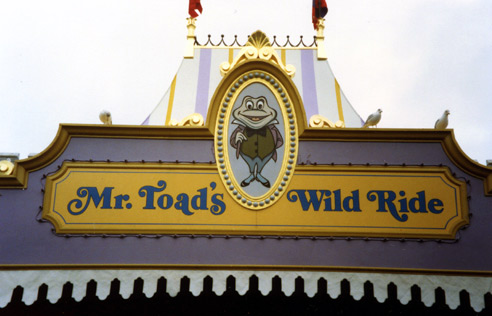Dr. Joseph Barber
And you thought we were all done with career fairs after the very busy beginning of September. If you are a PhD student or postdoc in a STEM field, then the good news is that there’s a career fair just for you coming very soon. The beginning of October is Biomedical & Life Sciences Career Fair time, and I encourage all PhD students and postdocs to make the use of this event to EXPLORE career fields, NETWORK with employers and Penn alumni representing their employers, and APPLY for actual positions. Even if you are not in the position to apply (perhaps you are early in your PhD program or just starting your postdoc), there is still lots you can do at a career fair to be productive. You can find below a post I wrote back in 2010 that summarizes 6 benefits of career fairs even when you are not applying for a job right now…
Six things you can do at career fairs even if you aren’t actively looking for a job
1) Hand people your well-formatted, mistake-free, Career Services’ critiqued resume. OK, if you are not looking for a job, this is one that you might be able to skip. But…, what happens if you are chatting with employers (see below), and someone asks about your experience, and then says, “do you have a resume I can take away with me?”. As you don’t want to miss this opportunity to network, which is the better answer:
- “Errr…., no, but I can write my name and email on this napkin”
- “Yes, this reflects my experience to date, and obviously I am going to be gaining more experience over the next few months/years. If I were interested in this type of opportunity, can you see any areas where additional experience might help me in this career field?”
- “What’s a resume?”
2) Network. People with effective networks build them continuously over time, and may not seek anything from their contacts for many months or years. They spend their time developing and maintaining their network so that when they do need help, the network is already there for them, and the people within the network know and trust them. The best time to network from a career perspective is when you are not actively looking for a job. You have more time, and you come across as less desperate. If you work hard to help people remember you by staying in contact, then you increase the likelihood that they’ll be thinking of you when future job opportunities arise. So, take time at career fairs to share your information with people in different career fields, think of creative ways to maintain contact with them over time to establish an effective relationship, and ask the most important question of all to gain access to their network: “Do you anyone you think I should talk with to find out more information?“
and the people within the network know and trust them. The best time to network from a career perspective is when you are not actively looking for a job. You have more time, and you come across as less desperate. If you work hard to help people remember you by staying in contact, then you increase the likelihood that they’ll be thinking of you when future job opportunities arise. So, take time at career fairs to share your information with people in different career fields, think of creative ways to maintain contact with them over time to establish an effective relationship, and ask the most important question of all to gain access to their network: “Do you anyone you think I should talk with to find out more information?“
3) Think about Plan B. You may have your heart set on one type of job, or working at one specific organization, and it is important that you work hard to achieve what you want. However, it never hurts to have a back-up plan, your career Plan B. If you are a graduate student, then you may be planning on following the tenure track, and seeking only academic teaching or research positions. The academic job market is hard to predict, and will always be changeable, but it will always be highly competitive, and there will always be someone who does not get the job they interviewed for. We hope that person is not you, and we’ll work hard with you to help you be the successful one, but it never hurts to be thinking about Plan B. If you need to switch tracks at a future date, will you have enough transferable skills and experiences to make you a competitive candidate in a completely different career field? At the career fair you can ask recruiters what they are looking for in resumes for the types of jobs they have available now. They might be able to help identify the kind of experiences you can gain in the present, and over the next few months/years, that might make you competitive for other types of jobs in the future.
4) Tell people about yourself. The question “tell me about yourself” will come up whenever you meet new people (whether spoken or inferred), but can also be asked during phone and in-person interviews. You need to have an interesting, succinct, and confident answer. You are the expert in the subject of you, and so it is the one topic that you should have no hesitation talking about. Career fairs are a great place to practice talking about yourself, as you need to summarize who you are, what skills you have, where you want to be going in the future, and how the person you are talking with might be able to help, all within about 30-60 seconds. When you are networking, people need to know what your network goals are so that they know how they can help you. For example, are you looking for information, opportunities, or future contacts?
5) Talk about your research. Graduate students have two types of tricky questions to answer in terms of what they have been doing with themselves. When telling people about yourself, you will of course mention the research you do, but research is not the only topic you should talk about. The “tell me about yourself” answer needs to be slightly broader (e.g., what brought you to Penn, what are some of the key skills you have, how have your experiences changed the way you think about aspects of the world, and how do you see yourself using your knowledge and skills in the future). When talking more specifically about your research, you will need to summarize what you do in a way that makes your subject understandable to a range of different people with differing degrees of expertise in your specific area. Can you tailor a summary about your research on ancient Aramaic texts or Tribble genes to experts in the field and to HR representatives? Can you make your research interesting and relevant to them? Again, career fairs are a great way to practice talking about your research, and it does take practice.
6) See how it is done. You don’t want your first career fair to be the one where you need to find a job. You want to work out all of your career fair nerves beforehand. Even if you don’t talk to any employers (and you really should – they won’t bite), you can still watch how your peers handle themselves at career fairs? You can see how they are dressed, and whether they are keeping their right hand free to shake hands with people they meet, without having to juggle paperwork and drinks (and that means thinking about which shoulder to hang your bag on, so it doesn’t slip off when extending your hand). Small things can sometimes count when you are trying to make a good first impression. You can listen to the types of questions they ask, and you can learn to emulate or avoid the good or bad approaches they use.
Make use of this BLAST from the PAST to help put you on track for your successful future!


 and the people within the network know and trust them. The best time to network from a career perspective is when you are not actively looking for a job. You have more time, and you come across as less desperate. If you work hard to help people remember you by staying in contact, then you increase the likelihood that they’ll be thinking of you when future job opportunities arise. So, take time at career fairs to share your information with people in different career fields, think of creative ways to maintain contact with them over time to establish an effective relationship, and ask the most important question of all to gain access to their network: “Do you anyone you think I should talk with to find out more information?“
and the people within the network know and trust them. The best time to network from a career perspective is when you are not actively looking for a job. You have more time, and you come across as less desperate. If you work hard to help people remember you by staying in contact, then you increase the likelihood that they’ll be thinking of you when future job opportunities arise. So, take time at career fairs to share your information with people in different career fields, think of creative ways to maintain contact with them over time to establish an effective relationship, and ask the most important question of all to gain access to their network: “Do you anyone you think I should talk with to find out more information?“